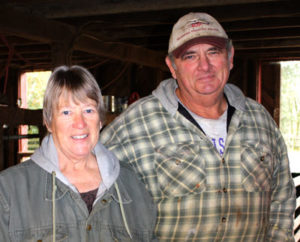FOR IMMEDIATE RELEASE: October 3, 2012
Contacts: Nicole Nielsen-Pincus, Willamette Program Manager: nicole (at) mckenzieriver.org
Liz Lawrence, Operations Manager: llawrence (at) mckenzieriver.org
541-345-2799
McKenzie River Trust Protects Railroad Island
Land Trust Purchases 63-Acre Island in the Willamette River Near Harrisburg

(EUGENE, OR) Landowners Wayne and Pam Swango have sold a 63-acre island in the Willamette River south of Harrisburg to the nonprofit McKenzie River Trust (MRT). The land trust’s purchase of the property, now called Railroad Island, protects critical fish and wildlife habitat along a dynamic stretch of the Willamette.

“Living along the river can sometimes be a challenge,” Wayne Swango says, acknowledging the river’s impact on his daily life. “We’ve lost some sheep that were stranded in high water. And part of our property is eroding – the river gives and takes whatever it wants to.”
It was partly this recognition of the river as a powerful and occasionally unpredictable force that caused the Swangos, who have roots in the area going back to the 1800s, to sell the 63-acre island. The Swangos own, live on, and farm an additional 200 acres on the east side of the river.
Railroad Island, named after the railroad bridge that crosses the land’s downstream end, is exceptional habitat for native fish and wildlife. With a network of complex gravel bars, side channels, and sloughs on the mainstem Willamette, Railroad Island is a refuge for Chinook salmon, steelhead, and migratory birds. As a natural area, the Island can also absorb high flows and lessen the impact of floodwaters.
The purchase of Railroad Island extends MRT’s conservation lands in the upper Willamette River basin. The property is several miles downstream of Green Island, a 1,000+ acre complex of fish and wildlife habitat that MRT has been restoring since 2005. In recent years, partners across Oregon have worked together to promote conservation along the Willamette. The statewide focus on the river in our own backyard attracted the attention of the Meyer Memorial Trust, and they awarded MRT a grant for pre-acquisition costs through the Willamette River Initiative. The Bonneville Power Administration contributed the additional funds for MRT to buy Railroad Island.
“Bonneville Power Administration funding helps fulfill an agreement that the State of Oregon made in 2010 to protect nearly 17,000 acres of Willamette Basin wildlife habitat,” says Lorri Bodi, the Bonneville Power Administration’s Vice President for Environment, Fish and Wildlife. “The agreement dedicates stable funding from electric ratepayers for 15 years to safeguard Willamette habitat for native species, supporting state efforts to protect the Willamette Basin and fulfilling BPA’s responsibility under the Northwest Power Act to offset the impacts of federal flood control and hydropower dams.”
Land trust accomplishments are often measured in the number of acres protected. But for Railroad Island, that may not be the best way to gauge success. “Railroad Island is a place for fish and wildlife where the dynamic river can move around without causing harm or loss of livelihood,” says Nicole Nielsen-Pincus, MRT’s Willamette Program Manager. “Gravel bars and floodplain forests provide a buffer from where people are trying to live or farm. That’s part of what makes this such a great conservation project.”
With the addition of Railroad Island, the McKenzie River Trust now owns 1,827 acres of land in western Oregon and has permanently protected an additional 1,830 acres with conservation easements. The Eugene-based land trust was founded in 1989.
#####
